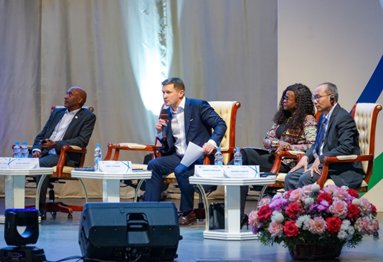RUDN University brought together 1,500 experts from 70 countries to propose solutions for 17 goals of sustainable development of the world

The conference brings together one and a half thousand experts. They will participate in 13 sections on all 17 sustainable development goals. Scientists, ministers, business owners and heads of public organizations will present research results and best practices to combat modern challenges of humanity in the field of ecology, agriculture, urban planning, and healthcare.
The main focus of this conference is on the 17 UN Sustainable Development Goals and how countries in the African region are achieving them. Our ecologists, agronomists, doctors, lawyers, engineers, and economists will share ideas on how to help African countries and change the world for the better. This is an integrated approach to cooperation, development of science, education and technology. At the conference site, where representatives from 70 countries gathered, participants have an excellent opportunity to choose the best areas for development and attract partners from other countries.
Oleg Yastrebov
Rector of RUDN University
Now it is important for specialists to develop not only professional skills, but also communication competencies. Professionalism, ethics and patient-centeredness are integral features of healthcare. At RUDN, thanks to the interdisciplinary approach and the constant process of intercultural communication, students have every opportunity to develop professional competencies and soft-skills.
Ramatoulaye Vouri
Minister of Technical and Higher Education of Sierra Leone
The GreenMetric ranking shows the contribution of universities to achieving sustainable development goals. Currently, 1050 universities from 85 countries are participating in it. Of these, 29 are African universities. Thanks to participation in the program, we can track development trajectories towards achieving sustainable development goals.
Riri Fitri Sari
President of the international university ranking UI GreenMetric WUR
The pandemic has pushed the development of digitalization. Now we need professionals who will develop telemedicine technologies. This will provide people from remote areas with access to digital medical services and services, including teledermatology, telecardiology, tele-oncology and telepsychiatry. In parallel, technical support staff need to be trained to manage and develop these digital resources.
Mengistu Kifle Gelan
Professor, Advisor to the Ministry of Health of Ethiopia
Ways to solve the problems of the African continent will be examined in detail at strategic and framework sessions, discussions on three tracks - “Biosphere”, “Society” and “Economy, Politics, Law and Partnerships”, which will take place on November 22, 23 and 24. The experiences of Morocco and Jordan will show the potential of drinking water purification systems. Brazil will share research into clean fishing, and Tunisia will address the issue of microparticle pollution in rubber. Experts will offer solutions to the problems of soil desertification, virus resistance to antibiotics, the proliferation of suburbs of megacities, high prices for vegetables, and the illiteracy epidemic.
Track “Biosphere”
Experts from Algeria, Brazil, Burundi, Gambia, Egypt, Zambia, Morocco, Indonesia, Jordan, Tunisia, Uganda, South Africa and other countries will discuss how to treat wastewater, how to prevent famine in Africa, how to combat global warming and what restrictions are preventing green energy in the region.
10% of the African population still drinks untreated land-based water. Women and children walk 3.7 kilometers a day to the spring. Drought and desertification affect agricultural development. In the world, 52% of areas are not suitable for growing crops.
Track “Society”
Scientists from Algeria, Angola, Ghana, Guinea-Bissau, Egypt, Zambia, Madagascar, Mali, Morocco, Namibia, Nigeria, Republic of Congo, Tanzania, Ethiopia and other countries will share how to prevent discrimination and achieve a balance of interests, how to attract investment to achieve main SDGs, what health systems need in countries with difficult climatic conditions.
The problem of “multidimensional poverty” affects the level of education. The highest concentrations of poverty are in sub-Saharan Africa, while the proportion of illiterate adult women in low-income countries has risen by 20 million over the past 20 years. 35% of early marriages occur in sub-Saharan Africa, and the percentage of gender inequality on the continent is 48.6%.
Track “Economics, politics, law, partnerships”
Researchers from Algeria, Angola, Burundi, Guinea-Bissau, India, Iran, Yemen, Kenya, Cote d'Ivoire, Namibia, Senegal, Sudan, Tanzania, Ethiopia and other countries will discuss what niches African countries can occupy in global production, how interaction with Asia will help solve problems of sustainable development, how to use alternative energy in the infrastructure of the continent.
Most people who do not have access to electricity live in Africa and Asia. 2.8 billion people rely on wood, coal and manure to heat their homes and cook food. This results in 4 million deaths from air pollution every year. Moreover, by 2050, the African continent will be home to 20 to 25% of the world's population, making the region one of the world's main markets.
Sergey Ivanov, a scientist from St. Petersburg, became the first winner of the RUDN University International Prize for scientific achievements and merits in the field of mathematics in the amount of 5 million rubles.
Egyptian scientist Abdelraouf Masoud Ali, associate professor at the Department of Environmental Management, Institute of Environmental Engineering, has been awarded the 2024 Egyptian State Incentive Prize in Agricultural Sciences.
Inventors from 26 countries and 35 regions of Russia presented more than 500 projects at the XVIII Moscow International Salon of Inventions and Innovative Technologies “Archimedes”. 340 projects belong to Russian participants, and their foreign colleagues — 215. RUDN University initiatives were awarded two gold medals.
Sergey Ivanov, a scientist from St. Petersburg, became the first winner of the RUDN University International Prize for scientific achievements and merits in the field of mathematics in the amount of 5 million rubles.
Egyptian scientist Abdelraouf Masoud Ali, associate professor at the Department of Environmental Management, Institute of Environmental Engineering, has been awarded the 2024 Egyptian State Incentive Prize in Agricultural Sciences.
Inventors from 26 countries and 35 regions of Russia presented more than 500 projects at the XVIII Moscow International Salon of Inventions and Innovative Technologies “Archimedes”. 340 projects belong to Russian participants, and their foreign colleagues — 215. RUDN University initiatives were awarded two gold medals.